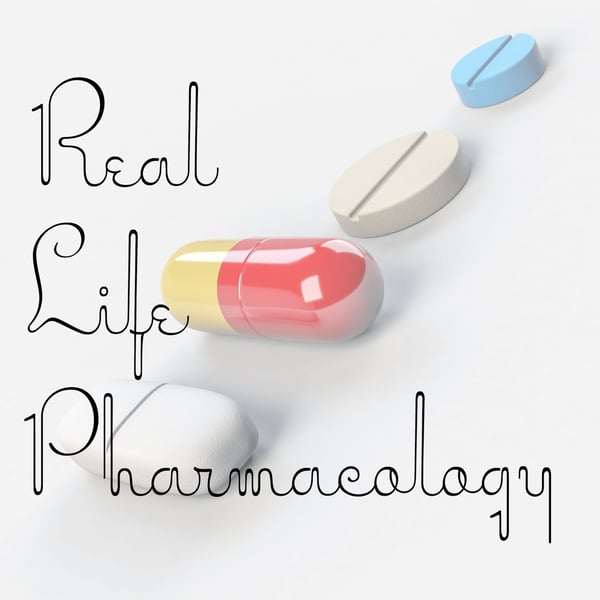Melatonin Pharmacology
Real Life Pharmacology - Pharmacology Education for Health Care Professionals
Eric Christianson, PharmD; Pharmacology Expert and Clinical Pharmacist
5 • 716 Ratings
🗓️ 20 May 2021
⏱️ 14 minutes
🧾️ Download transcript
Summary
Melatonin, commonly taken by patients for insomnia, is an endogenous hormone produced by the pineal gland. It is an over-the-counter supplement available in dosage forms such as liquid drops, gummies, and tablets. The pharmacology of melatonin is primarily through the activation of melatonin receptors in the suprachiasmatic nucleus; it is also a derivative of L-tryptophan. The production and secretion of melatonin is stimulated by darkness and is inhibited by light. Melatonin concentrations are also shown to vary with age. Its production primarily begins between months 3-4 post-birth, and it peaks between years 1-3. The production and secretion decrease with age and can play a role in insomnia in adults. The doses of melatonin can vary but is commonly found in 1 mg, 3 mg, 5 mg, and 10 mg. Although it is usually taken in higher doses, doses between 0.1-0.5 mg may be adequate.
Certain things need to be taken into consideration when a patient is taking melatonin. Some of the things that should be taken into consideration are if it works as it’s expected to or if the patient is already on stimulating medications that can cause insomnia. If the patient is taking other medications like zolpidem, trazodone, or mirtazapine, melatonin may not be needed. Other things that should be taken into consideration are if the patient tolerates melatonin well and if a lower dose of melatonin can be used. Melatonin is commonly well-tolerated, but it can occasionally cause CNS issues at higher doses such as oversedation, cognitive impairment. It can even cause hyperprolactinemia that can cause sexual dysfunction, fertility risk, lactation, and is associated with lower bone mineral density.
Common adverse drug reactions associated with the pharmacology of melatonin are headache, CNS depression, irritability, and daytime sedation. With long-term use, melatonin can cause suppression of the hypothalamic-pituitary axis. Melatonin is primarily metabolized by CYP1A2, CYP2C9, and CYP2C19. The concentration and efficacy of melatonin can potentially be impacted by medications that induce or inhibit the CYP enzyme system, such as propranolol, calcium-channel blockers, and others. Interactions of melatonin that are not CYP mediated are additive effects when taken with other sedatives, caffeine, and ethanol that can reduce the efficacy of melatonin, or other medications that can increase the risk of adverse drug reactions.
Melatonin is regulated by the FDA as a dietary supplement, and not as a medication. Toxicology studies are limited.
Show notes provided by Chong Yol G Kim, PharmD Student.
Resources
Information is taken directly from the podcast episodeLight/dark melatonin levels, concentrations with age paragraph 1: 10.1016/s0531-5565(98)00054-0 , podcastADRs paragraph 2: Lexicomp, podcastCYP interactions paragraph 3: LexicompToxicity paragraph 4: Lexicomp
Transcript
Click on a timestamp to play from that location
| 0:00.0 | Hey all, welcome back to the Real Life Pharmacology podcast. I'm your host, pharmacist, Eric Christensen. |
| 0:05.6 | Thank you so much for listening today. As always, go check out real life pharmacology.com. |
| 0:11.3 | If you haven't subscribed there, do that. I give away a free 31 page PDF on the top 200 drugs. |
| 0:18.2 | Great little study guide, a great little refresher. If you're, you know, |
| 0:21.7 | doing in pharmacology classes, taking board exams, final exams, great little resource refresher. |
| 0:28.8 | That's not going to cost you a dime there. So simply an email. We'll get you that. We'll get |
| 0:34.3 | you updates on when we've got new content and things available too |
| 0:37.5 | so again real life pharmacology dot com go check that out all right so let's get into the drug |
| 0:45.2 | of the day today and that is melatonin and this is a medication or i guess it's more classified as a supplement, at least in the United States, readily available over the counter. |
| 1:02.7 | And from my experience, it is readily taken by a lot of patients. |
| 1:20.7 | It feels like about 20 to 30% of patients are taking melatonin. That might be an exaggeration and a little bit high, but I can assure you in my work as a consultant, I see it on a daily basis for sure. |
| 1:30.0 | So with that said, it's used primarily for insomnia and to help with sleep. |
| 1:38.9 | Mechanistically, how does it do that? |
| 1:41.6 | Well, melatonin is actually found naturally occurring in the body, and it promotes sleep and |
| 1:52.4 | the circadian rhythms, the kind of sleeping and waking cycle. And it's actually made from the amino acid |
| 2:00.5 | tryptophan, so you've always heard or maybe you've |
| 2:03.6 | heard around Thanksgiving you know in Turkey and triptophan it makes you sleepy and that type of |
| 2:08.3 | thing and so that's kind of a little bit where that comes from in that |
| 2:13.7 | tryptophan is a kind of a building block for the production of melatonin. |
| 2:20.8 | So interestingly, kind of as a person ages, this secretion of this hormone that, you know, |
| 2:30.8 | helps promote sedation and sleepiness and that type of thing, |
| 2:36.2 | varies with age. |
... |
Please login to see the full transcript.
Disclaimer: The podcast and artwork embedded on this page are from Eric Christianson, PharmD; Pharmacology Expert and Clinical Pharmacist, and are the property of its owner and not affiliated with or endorsed by Tapesearch.
Generated transcripts are the property of Eric Christianson, PharmD; Pharmacology Expert and Clinical Pharmacist and are distributed freely under the Fair Use doctrine. Transcripts generated by Tapesearch are not guaranteed to be accurate.
Copyright © Tapesearch 2025.

